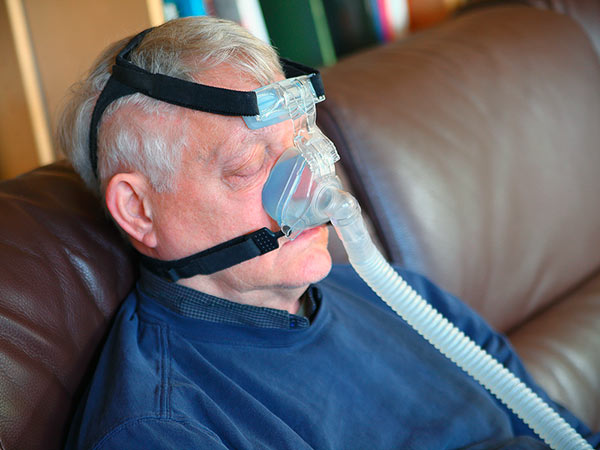
CPAP Intolerance
What is CPAP?
CPAP (Continuous Positive Airway Pressure) is a standard recommendation by sleep physicians for treatment of obstructive sleep apnea (OSA).
Obstructive sleep apnea is a chronic disorder that causes the body to stop breathing while the patient is asleep.
Obstructive Sleep Apnea
OSA is a dangerous health condition; it deprives the brain and body systems of necessary oxygen and rest that are vital for healing and development:
- As the soft tissues in the throat and upper airway relax during sleep, they sag and droop, blocking the airway and forcing the body to stop breathing.
- The brain senses a breathing emergency and the patient wakes up, gasping and choking for air.
- The OSA cycle repeats multiple times per hour overnight.
Learn more about obstructive sleep apnea.
How does CPAP work?
CPAP equipment produces a steady flow of gently pressurized air that is delivered through a hose connected to a face mask that the patient wears during sleep. As the patient breathes in through the mask, the pressurized air helps to push back on the floppy airway tissue and keep it in place, preventing blockage.
The sleep physician will recommend the type of CPAP equipment and appropriate settings based on the severity of the patient's OSA diagnosis. Generally CPAP provides pressurized air flow only (vs. oxygen supply), however the physician may recommend the use of supplemental oxygen with CPAP.
For most OSA patients, consistent use of CPAP can fully prevent or greatly reduce apnea events (when breathing stops).
What is CPAP Intolerance?
Some OSA patients are unable to use CPAP, or become frustrated and stop using it altogether. Common reasons why patients become CPAP ‘intolerant’ include:
- Feeling claustrophobic or tethered while wearing the CPAP mask-hose
- Noise of the running CPAP machine is bothersome to patient (or sleep partner)
- Dry throat/mouth, eye dryness or congested nasal passages
- Facial skin irritation or bruising from mask
- Challenges of travel with CPAP equipment
- Removing the mask during sleep
- Stomach air bloating
- Breathing discomfort; too much/too little pressure or a feeling of ‘swallowing’ air
- Difficulty sleeping on side or stomach (mask leaks or comes off)
CPAP Alternatives
Sleep physicians see a number of patients with sleep apnea or hypopnea that are unable to tolerate CPAP therapy. Based on the patient's diagnosis, the physician may recommend alternative treatment strategies to improve sleep breathing and prevent airway blockage:
Oral Appliance Therapy for OSA
Athens dentist Dr. Phillip Durden has completed advanced training in dental sleep medicine and oral appliance therapy for treatment of obstructive sleep apnea. Dr. Durden works with the sleep physician to design a removable oral appliance to aid in preventing airway collapse.
An oral sleep appliance fits over the teeth and helps to position the lower jaw (mandible) slightly forward; this helps keep the airway open. If the tongue or soft palate are relaxing and drifting into the airway during sleep, the oral appliance can be modified to add tissue support and prevent this from occurring.
Dr. Durden and the sleep physician monitor the patient's sleep tests to measure breathing improvement and make adjustments to the appliance as needed.
Recommended Lifestyle Changes for OSA
OSA patients may benefit from losing weight to reduce the amount of body fat around the neck; this can sometimes help alleviate compression on the airway that may be a contributing factor of OSA. Alcohol and sedatives depress the respiratory system; eliminating these substances may help improve the overall effort to breathe.
OSA Surgery
Surgery for obstructive sleep apnea is uncommon, but may be helpful in some cases. Medical and surgical professionals may recommend removal of tonsils or adenoids, or, modification of palatal tissue or the uvula (fleshy structure that hangs in the back of the throat).
Learn more about oral appliance therapy and obstructive sleep apnea.
Don't give up on Obstructive Sleep Apnea Treatment
If you have been diagnosed with obstructive sleep apnea and are having difficulties with CPAP therapy, it is important that you talk to your physician and find out what treatment alternatives may be available. OSA is a threat to your health and quality of life, and we want you to have the best of both.
Dental Sleep Medicine of Athens
If you have a referral for oral appliance therapy from your sleep physician or have questions about CPAP intolerance, please contact our Dental Sleep Medicine Team for more information.